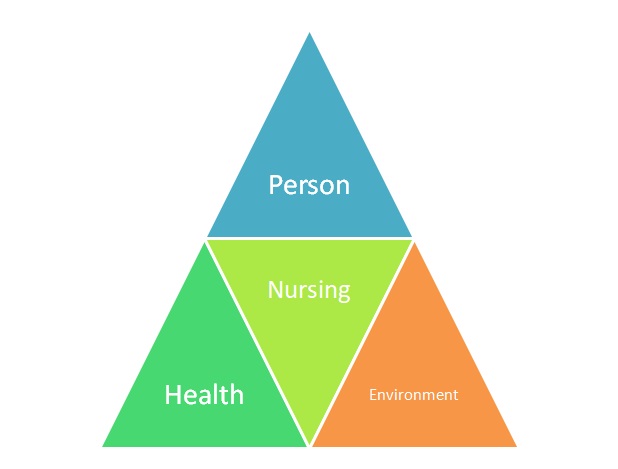The provision of nursing care is a complex and multifaceted process that involves a multitude of elements and tasks. In particular, there exists a nursing metaparadigm that is comprised of four concepts such as a person, nursing, health, and environment. These components represent critical dimensions in the nursing philosophy of advanced practice nurse (APN). In fact, one of the major roles of an APN is to serve as an advocate for their patients. As a result, APNs need to develop a unique ability to understand people and their natures, see beyond what is shown on the outside and sense the moods and emotions of clients.
Valued Personal Concepts
Define
In nursing, a person is viewed as a complex being with social, emotional, spiritual, and physical dimensions (Meehan, 2003). In turn, the environment represents social, emotional, spiritual, and physical surroundings of a person (Meehan, 2003). Health is defined as a state of harmony and internal contentedness combined with the feeling of personal dignity a sense of having a life purpose (Meehan, 2003). Finally, nursing stands for a response to unfulfilled human needs in the form of help, assistance, support, response, and consolidation in the periods of illness (Meehan, 2003). The four elements are tightly interconnected.
Describe
The contemporary vision of health dominant in western healthcare systems is primarily holistic (Papathanasiou, Kourkouta, & Sklavou, 2013). This means that nursing professionals approach the needs for care of their patients as more than superficial health problems (Morton & Fontaine, 2017; Morton & Fontaine, 2012). The modern idea of the effective treatment includes a thorough analysis of each specific patient as an individual. Patients are viewed in connection with their environments and not as separate entities (Brooker & Waugh, 2013). In this way, the aforementioned metaparadigm components are the essential parts of care.
Explain
Specifically, treating patients with the focus on their being complex persons stands for the inclusion of their environment as a factor impacting their health. In this relationship, nursing stands for the delivery of the most appropriate response based on a detailed examination of a patient’s person, environment, and health (Swanson, 1993). For me individually, none of the components seem more or less important than others. The four elements exist in a perfect balance. Consequently, nursing care results from the knowledge about the person, environment, and health.
Current Practice
Caring represents the foundation of nursing that serves as the ultimate basis for all the nursing practice frameworks and principles. However, in the contemporary nursing settings, the professionals are often exhausted, overworked, and have to perform numerous tasks in technologically-dominated environments (Adams, 2016). Potentially, these factors distract from the importance of caring as a human response. For me personally, the focus on the personhood of my patients is the core of my practice. In turn, the other elements of the metaparadigm – health and environment come along with the person and help guide the care in the right direction. The concepts that can be added to this scheme are social justice, collaborative practice, and professionalism. They could correspond with the person, environment, and health accordingly as the elements helping achieve a higher level of nursing care.

Conclusion
Care is the foundation of nursing on which all of the principles of the nursing practice are based. Using the metaparadigm of nursing that is comprised of four elements it is possible to envision nursing as the action resulting from the knowledge about the other components. Namely, studying patients as persons and including their environments as factors impacting their health, a nurse can then formulate an appropriate care strategy. A contemporary nurse is overwhelmed with a multitude of tasks and the need to perform in a tech-savvy environment. Focusing on the paradigm and its elements helps adhere to the major purpose of this profession – the provision of professional and deep human response to patients in the time of illness.
References
Adams, L. Y. (2016). The conundrum of caring in nursing. International Journal of Caring Sciences, 9(1), 1-8.
Brooker, C., & Waugh, A. (2013). Foundations of nursing practice e-book: Fundamentals of holistic care. Amsterdam, The Netherlands: Elsevier Health Sciences.
Meehan, T. C. (2003). Careful nursing: a model for contemporary nursing practice. Journal of Advanced Nursing, 44(1), 99–107.
Morton, P. G., & Fontaine, D. K. (2012). Essentials of critical care nursing: A holistic approach. New York, NY: Lippincott Williams & Wilkins.
Morton, P. G., & Fontaine, D. K. (2017). Critical care nursing: A holistic approach. New York, NY: Lippincott Williams & Wilkins.
Papathanasiou, I., Kourkouta, M., & Sklavou, L. (2013). Holistic nursing care: Theories and perspectives. American Journal of Nursing Science, 2(1), 1-5.
Swanson, K. M. (1993). Nursing as informed caring for the well-being of others. Journal of Nursing Scholarship, 25(4), 352-357.